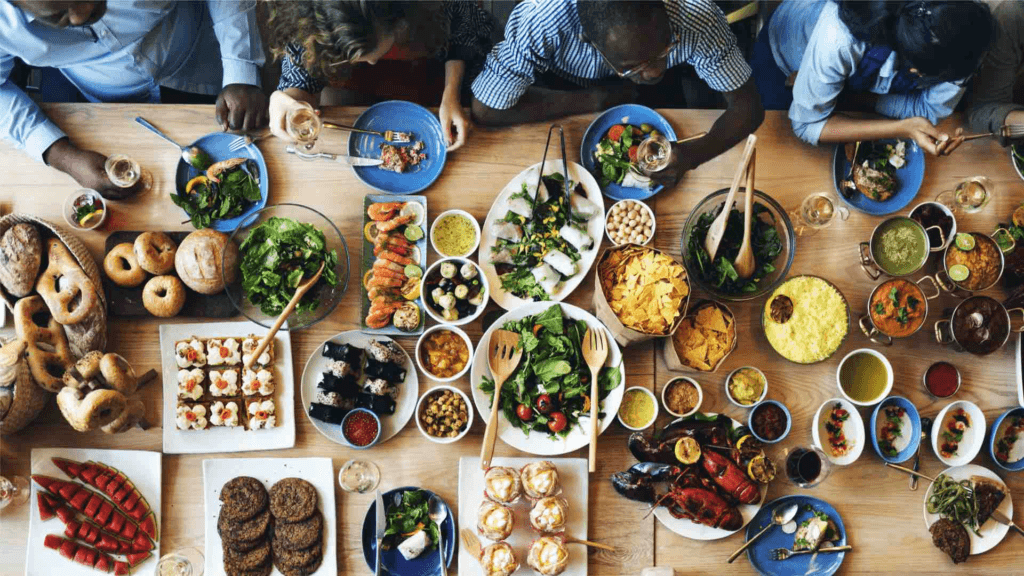
Understanding dining etiquette is essential, especially for international students who plan to study and live in Germany. Dining practices can vary significantly across cultures, and becoming familiar with German dining norms can help students navigate social situations more confidently. In this article, we will provide a detailed guide on German dining etiquette and how it differs from other cultures. This guide will be useful for international students who wish to adapt smoothly to German customs and avoid potential cultural misunderstandings.
Why Is Dining Etiquette Important in Germany?
In Germany, dining is not just about food but also about respect, politeness, and tradition. People place a strong emphasis on good manners, whether dining at home, in restaurants, or during social gatherings. Dining behavior reflects how much you value the people you share a meal with and your understanding of cultural norms. While German dining etiquette shares some similarities with other Western cultures, there are subtle nuances that students from other countries should be aware of to avoid unintentional faux pas.
Table Manners and Seating Arrangements
Seating Protocol
In Germany, table arrangements often follow a certain protocol, especially during formal meals. It’s common for hosts to assign seating or suggest where guests should sit. If you’re invited to someone’s home or a group event, wait until the host shows you where to sit before taking a seat.
Standing Until Everyone is Seated
A typical practice in German dining culture is to remain standing until everyone is invited to sit at the table. In group settings, people also tend to wait for all guests to arrive before beginning the meal. It’s considered polite to avoid starting your meal until everyone at the table has their food, even if yours is served first.
Use of Utensils: Fork, Knife, and Hands
Continental Style of Eating
One of the key differences in dining etiquette is the way Germans use utensils. Germans follow the continental style, where the fork is held in the left hand and the knife in the right hand throughout the meal. Unlike in some cultures where people switch hands or cut the food first and then place the knife down, Germans keep both utensils in hand.
Minimal Use of Hands
Using hands to eat is generally discouraged, even for foods like pizza or burgers that may be eaten with hands in other cultures. Germans are accustomed to using a fork and knife for almost everything, including foods that seem more casual.
Starting the Meal: Toasts and Drinks
Saying “Guten Appetit”
Before starting a meal, it’s common to hear “Guten Appetit,” which translates to “Enjoy your meal.” The phrase is usually said by the host or another person at the table, and everyone responds with the same greeting. This small ritual sets a positive tone for the meal and shows respect for the host’s efforts.
Prost: Toasting Etiquette
When it comes to drinks, especially beer or wine, toasting is a significant part of German culture. People say “Prost!” when clinking glasses. It’s important to maintain eye contact with the person you are toasting with as a sign of respect. Also, never cross arms with someone else while clinking glasses, as this is considered bad luck.
How to Handle Alcohol
Drinking beer and wine is common during meals, but it’s good to note that excessive drinking is frowned upon, particularly in formal settings. Knowing your limits and drinking responsibly is part of German dining etiquette. If you don’t drink alcohol, it’s perfectly acceptable to toast with water or non-alcoholic beverages.
Punctuality and Dining Times
Being Punctual
Germans take punctuality very seriously, and this extends to dining appointments. Whether you are invited to a home-cooked meal or a dinner reservation, arriving on time is essential. Being late is considered disrespectful, and if you anticipate being more than a few minutes late, it’s polite to inform your host or restaurant ahead of time.
Mealtime Schedules
In Germany, meal times are often fixed. Breakfast (“Frühstück”) is typically early, between 7:00 AM and 9:00 AM. Lunch (“Mittagessen”) is the main meal of the day, usually served between 12:00 PM and 2:00 PM. Dinner (“Abendessen” or “Abendbrot”) is lighter and eaten between 6:00 PM and 8:00 PM. Restaurants may have specific lunch and dinner hours, so it’s advisable to plan your meals accordingly.
Paying the Bill: What to Know
Splitting the Bill
Unlike some cultures where one person might cover the entire bill, it’s common in Germany to split the bill equally among all diners, unless otherwise agreed. When dining out with a group, expect the server to ask if you would like to pay separately (“Getrennt zahlen”) or together (“Zusammen zahlen”). Make sure to specify your preference when the bill arrives.
Tipping Etiquette
Tipping in Germany is appreciated but not obligatory. A standard tip is around 5-10% of the total bill, depending on the level of service. It’s customary to round up the bill to the nearest euro or slightly above. Instead of leaving cash on the table, hand the tip directly to the server when paying. If you’re paying by card, you can mention the total amount you wish to be charged, including the tip.
Invitations to Homes: Dos and Don’ts
Bringing a Gift
If you are invited to someone’s home for a meal, it’s customary to bring a small gift as a token of appreciation. Flowers, wine, chocolates, or a small souvenir from your home country are popular choices. However, avoid giving lilies or chrysanthemums as they are associated with funerals in Germany.
Taking Off Shoes
In many German households, guests are expected to remove their shoes upon entering. Some homes provide indoor slippers for guests. Pay attention to whether others are removing their shoes and follow suit to show respect for your host’s home.
Table Conversations: Politeness and Topics to Avoid
Engaging in Light Conversations
During meals, Germans value engaging in meaningful but polite conversations. Politics, religion, and other controversial subjects are usually avoided unless you know the group well. Instead, talk about travel, food, hobbies, or other light topics. Interrupting someone while they are speaking is considered impolite, so take turns and listen attentively.
Use of Formal Language
Depending on the formality of the setting, Germans may use formal language when addressing each other. If you’re unsure whether to use the formal “Sie” or informal “du,” observe how others address each other or ask politely. In restaurants or with strangers, it’s safer to use “Sie” to avoid being disrespectful.
Handling Mistakes: What to Do if You Slip Up
Acknowledging Small Mistakes
If you make a mistake, such as starting your meal before others or accidentally misusing a utensil, a simple apology is usually enough to smooth things over. Germans are generally understanding, especially if you are a foreigner and still learning their customs.
Learning and Adapting
Observing others and asking questions if you’re unsure about something can help you adapt more quickly to German dining etiquette. Hosts and locals often appreciate the effort you make to learn their customs, even if you don’t get everything right the first time.
Conclusion: Adapting to German Dining Etiquette as an International Student
For international students, learning German dining etiquette can initially feel overwhelming, but it becomes easier with practice and observation. Familiarizing yourself with these customs will not only help you avoid awkward situations but also allow you to connect better with locals and enjoy the social aspects of dining in Germany. From punctuality and utensil use to toasting traditions and tipping practices, every aspect of German dining reflects the country’s values of respect, precision, and politeness.
By following these guidelines and being open to learning, international students can smoothly navigate dining scenarios, whether in restaurants, homes, or social events. Understanding these nuances will enhance your experience in Germany, allowing you to make meaningful connections and fully immerse yourself in the local culture.


